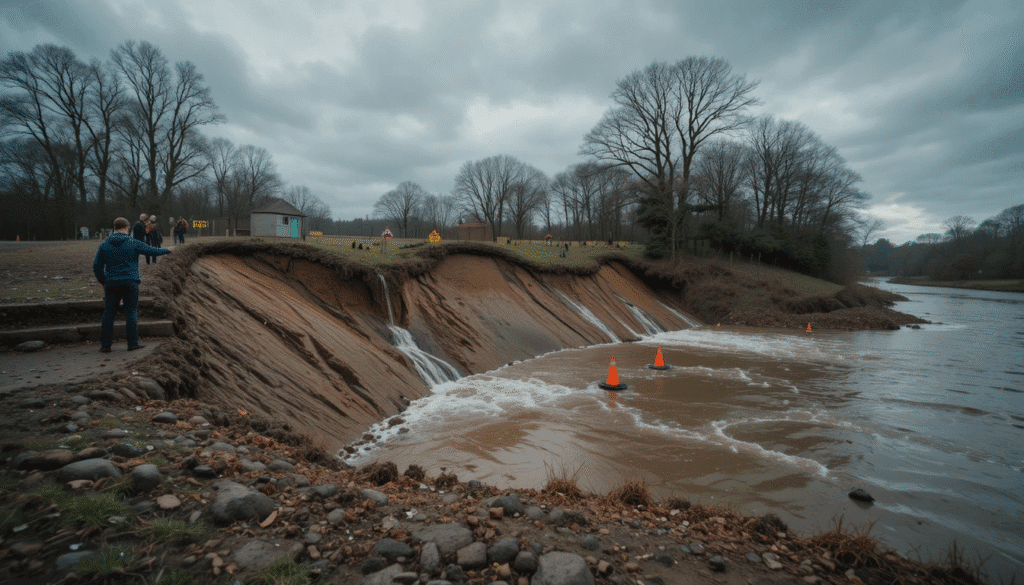It was one of those quiet, chilly mornings in Bournemouth when everything seemed normal. Parents were walking their kids to school, a few people were out jogging, and dogs were busy chasing after tennis balls. Then someone shouted and that’s when everyone saw it. A huge section of land near the riverside had just given way. The riverbank collapse Iford Playing Fields wasn’t just a small erosion crack. It was a full-blown chunk of earth sliding into the River Stour.
At first, people thought it was just another minor slip something the council would patch up in a few days. But when you stood there and saw the depth of that drop, it hit you. Nature doesn’t ask for permission before it reclaims what’s hers.
What Exactly Happened at Iford Playing Fields
Eyewitnesses said the ground near the walking path had been soft for days. After weeks of constant rain, the soil couldn’t hold up anymore. Around mid-morning, part of the riverbank collapse Iford Playing Fields happened right where families usually walk their dogs or sit to enjoy the view.
No one got hurt, but the damage was serious. Trees had fallen halfway into the river, their roots hanging like tangled ropes. You could see where the land used to be, just empty air now. The council quickly fenced off the area, but the shock lingered. It’s strange how something that feels permanent like a river path can disappear overnight.
Why Did the Riverbank Collapse Happen?
If you’ve lived in Bournemouth long enough, you’ve probably noticed how unpredictable the weather’s become. One day it’s sunny, the next it’s pouring nonstop. The riverbank collapse Iford Playing Fields incident is a reminder that this kind of instability adds up.
Experts believe it was caused by a mix of heavy rain, natural soil erosion, and rising river flow. Over time, the current eats away at the riverbank’s base, especially when the soil is waterlogged.
Locals mentioned they’d seen small cracks forming weeks before. Most people just ignored them. Who would think those cracks could turn into a five-foot drop overnight? Sometimes, small warnings are easy to overlook until they’re not.
What the Council and Experts Are Doing Now
The Bournemouth, Christchurch and Poole (BCP) Council didn’t waste time after hearing about the riverbank collapse Iford Playing Fields. They set up barriers, posted warning signs, and started safety inspections within hours. Environmental engineers have been checking how far the soil has shifted and whether nearby paths are at risk.
There’s talk about reinforcing the bank using stone blocks and deep-rooted plants that can hold the soil better. It’s going to take time, though. Nature doesn’t fix overnight. And when you’re dealing with something like a live riverbank, rushing it could cause even more damage.
If you want to track the official updates, the BCP Council website shares public notices and progress reports about ongoing work in the area.
How Locals Are Reacting
When the riverbank collapse Iford Playing Fields happened, it wasn’t just land that fell it was a piece of community life. Iford Playing Fields is where locals come to breathe, walk, laugh, and unwind. Suddenly, their favorite path was gone.
“I’ve walked my dog there every morning for six years,” said one resident. “Now, I don’t even let him near that part. It’s too scary.”
Parents who bring their kids to the park are worried, too. What if the erosion spreads? What if another section gives way during a rainy week? These aren’t dramatic questions they’re real fears that people living nearby have to think about every day.
Environmental Concerns and Wildlife Impact
The riverbank collapse Iford Playing Fields didn’t just affect humans. It shook up local wildlife too. Birds lost some of their nesting trees. Sediment slipped into the river, muddying the water and affecting fish. But nature’s resilient. Once the soil settles and new growth begins, the area will probably recover.
Environmental groups have already stepped in to monitor the ecosystem. They’re encouraging volunteers to help replant vegetation once it’s safe. It’s one of those small reminders that even in disaster, people come together to heal what’s broken.
Can It Happen Again?
Short answer? Yes — unless stronger measures are taken.
The riverbank collapse Iford Playing Fields shows what can happen when erosion goes unchecked. The council’s long-term solution involves reinforcing the bank, improving drainage, and using eco-friendly materials that can handle heavy rain and river pressure.
Experts also suggest more frequent inspections of high-risk areas, especially after storms. It’s better to spot weak spots early than to deal with a collapse later. Maybe this time, people will pay attention to those warning cracks.
What You Can Do If You Visit
If you’re planning to visit the park anytime soon, stay alert. Stick to fenced paths, avoid edges near the river, and keep pets on a leash. The ground may look fine, but it’s often unstable just beneath the surface.
The Environment Agency also has excellent guides on how to stay safe near eroded riverbanks.
And honestly? It’s not just about safety it’s about respect. When nature shows her strength, the least we can do is step back and give her space.
How It Feels to Witness It
Standing there that morning, looking at the collapsed ground, you couldn’t help but feel small. The riverbank collapse Iford Playing Fields wasn’t just a local event; it was a reality check. The earth beneath our feet isn’t as stable as we think.
It’s weird — we build paths, fences, and parks thinking they’ll last forever. But nature always finds a way to remind us who’s in charge. The silver lining? People are talking, learning, and paying attention. And that’s how change starts.
if you’re looking for a more serene experience, check out Luxury Villas Italy Le Collectionist for your next escape.
FAQs
Q1: What caused the riverbank collapse at Iford Playing Fields?
Heavy rainfall, soil saturation, and ongoing river erosion slowly weakened the ground, leading to the collapse.
Q2: Did anyone get hurt during the collapse?
Thankfully, no. Locals noticed the damage early, and authorities acted fast.
Q3: Is the area safe to visit now?
Parts of it are closed for safety. Always follow local council signs and avoid unstable ground.
Q4: Will the council fix the damage?
Yes, the council plans to restore the riverbank with reinforced structures and sustainable vegetation.
Q5: Could this happen again?
It’s possible, especially if erosion continues. Regular maintenance and better drainage can reduce the risk.
Conclusion
The riverbank collapse Iford Playing Fields wasn’t just a news headline — it was a wake-up call. A reminder that even peaceful places can shift in seconds. But it also showed how quickly a community can come together, how nature heals, and how awareness can turn into action.


